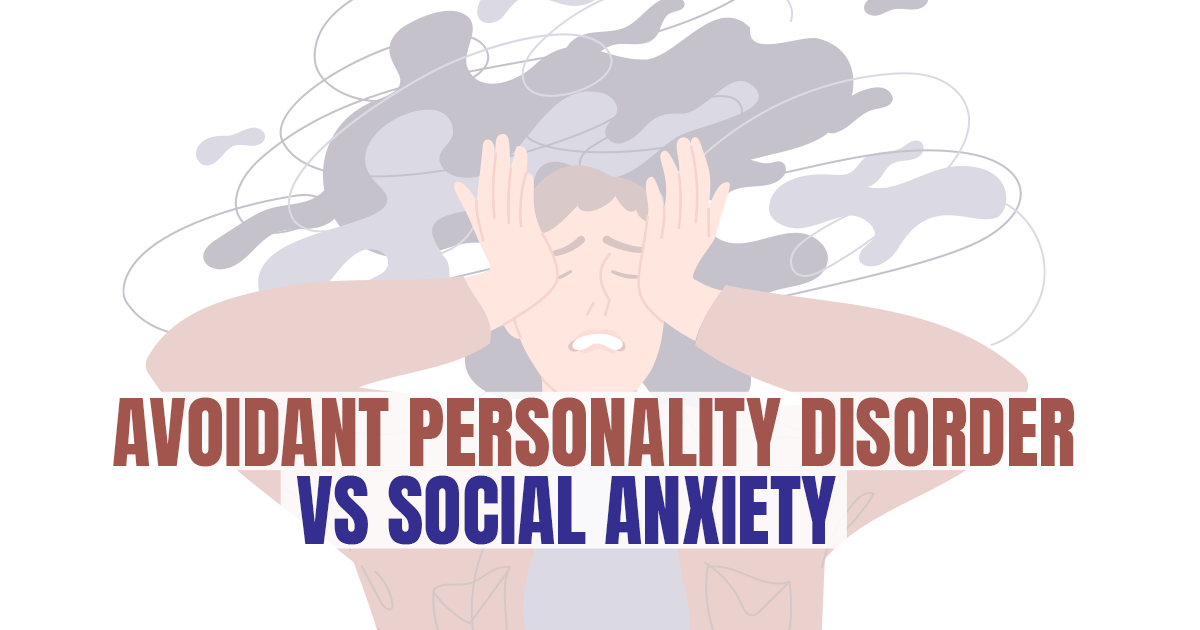There are some key reasons we often see a comparison in avoidant personality disorder vs. social anxiety. The two conditions are separate diagnoses, but they have some similarities and overlaps.
Treatment and the outlook varies between the two despite the similarities, so it’s important to see a medical professional who can make a proper diagnosis.
What is Avoidant Personality Disorder?
Avoidant personality disorder or AVPD is a pattern of behavior that relates to social inhibition. The pattern is enduring, meaning it’s consistent and ongoing.
- Someone with this personality disorder might be highly sensitive to rejection and experience feelings of being inadequate.
- The symptoms of avoidant personality disorder can lead to problems in relationships and work situations.
- The disorder includes being highly sensitive to criticism and having extreme shyness.
- AVPD is a Cluster C personality disorder. Cluster C personality disorders involve disorders with anxiety or fearfulness.
- Environmental risk factors for Cluster C personality disorders include physical abuse, sexual abuse, and both physical neglect and emotional neglect.
AVPD is associated with other mental health conditions, and primarily anxiety disorders like social anxiety disorder.
Avoidant personality disorder symptoms include:
- Wanting to be liked in an extreme way
- A lack of pleasure in activities known as anhedonia
- Anxiety that you’ll say or do the wrong thing
- Anxiety triggered by social situations
- Being a people pleaser to avoid conflict
- Avoiding situations because of a fear of rejection
- Avoidance of social events or situations
- Being highly self-conscious
- Tense, fearful demeanor
- Lack of trust in other people
- Low self-esteem
- Interpreting neutral situations as being negative
- Self-isolation and a lack of a social life
- Unwillingness to try new things or take risks
A mental health professional can diagnose avoidant personality disorder based on criteria in the Diagnostic and Statistical Manual of Mental Disorders (DSM). For a diagnosis, the pattern of symptoms and avoiding social contact has to be consistent.
Many people with an avoidant personality disorder don’t get treatment. When they do receive treatment, it’s most often for a particular problem in their lives at that point in time.
- Personality disorders are difficult to treat since they’re an enduring behavioral pattern but talk therapy can be successful.
- Behavioral therapy for a personality disorder, including AVPD, can help reduce symptoms and help someone develop coping skills.
- There aren’t any specific medications approved currently to treat AVPD, but if there’s a co-occurring condition such as depressive disorder or anxiety, medicine may be used to treat those symptoms.
What is Social Anxiety Disorder?
Social anxiety disorder is a specific type of anxiety disorder. Sometimes you’ll hear it referred to as a social phobia. With social anxiety disorder, you might have a hard time meeting new people, participating in social activities, or talking to people. You have social fears that other people will judge you, and you can realize the fear isn’t rational.
Having a social anxiety disorder isn’t just being shy. Shyness doesn’t typically disrupt your life. Social anxiety disorder can affect your functionality at school or work, and impede your ability to form close relationships.
An estimated 15 million adults in the United States have social anxiety disorder according to the Anxiety and Depression Association of America. Symptoms typically begin to appear around the age of 13.
When you’re in a social interaction, you might experience physical symptoms of this mental illness. These can include nausea, blushing, and sweating as well as shaking and trembling.
According to the National Institute of Mental Health, you could have dizziness, lightheadedness, or a rapid heart rate. If you have a social phobia disorder, you might have difficulty making eye contact with people you don’t know well.
Psychological symptoms of this disorder in adults and adolescents include:
- Intense fear or worry about social situations
- Being worried for days or even weeks before a social event
- Avoiding situations that are social in nature, or trying to blend in if you have to go
- Worries about embarrassing yourself
- Fears that other people will notice your fear or nervousness
- Using alcohol to socialize
- Avoiding work social events that aren’t required like company functions and company parties
While it’s normal to feel anxiety occasionally, if you have social phobia, it interferes with your life because you avoid everyday situations like job interviews, public restrooms, or talking on the phone.
You may not have social anxiety symptoms in all situations. For example, some people have social anxiety just when it comes to eating in front of other people.
- Research shows a combination of genetics and environmental factors contribute to the development of social anxiety disorder.
- Physical or emotional abuse, family conflict, and bullying are environmental factors that can play a role.
- A serotonin imbalance might also contribute to an anxiety disorder. Serotonin is a brain chemical playing a role in mood regulation.
- Additionally, some research points to an overactive amygdala as a potential risk factor for social anxiety. The amygdala is part of the brain that controls the fear response and thoughts or feelings of anxiety.
Treatment options for a social anxiety disorder often include therapy such as cognitive therapy and medication. Therapy may be individual or take place in the format of cognitive-behavioral group therapy during the treatment period.
Comparing Avoidant Personality Disorder vs Social Anxiety
As you might see from the symptoms above, there is a significant amount of overlap when we compare avoidant personality disorder vs social anxiety. Similarities between the two conditions include fears of rejection leading to the avoidance of social situations.
In most cases, someone with an avoidant personality disorder is more socially isolated. Someone with an avoidant personality disorder also has a harder time building relationship in their personal life than someone with social anxiety and has more problems with functionality. There’s a sense of internal consistency that comes with a personality disorder.
- In many ways, AVPD is a more severe form of social anxiety.
- A personality disorder is characterized by traits and tendencies making up someone’s personality.
- Personality disorders are more difficult to treat than mental health disorders like anxiety because of the fixed, constant nature of personality.
- Personality disorders may also be more influenced by genetics. A borderline personality disorder is one of the more well-known of these conditions.
- In a lot of cases, someone with a personality disorder has a harder time realizing they have an issue. Someone with an anxiety disorder on the other hand will often know they’re being irrational.
- Anxiety disorders tend to be very treatable with therapy like CBT or sometimes exposure therapy. Many of the key differences between social anxiety disorder and avoidant personality disorder come down to the severity of symptoms.
- Because of the high correlation with low self-esteem, someone with an avoidant personality disorder is also more likely to have a co-occurring mental health disorder such as addiction, eating disorders or depression.
- Someone with AVPD is more likely to have suicidal thoughts or make suicidal behaviors than someone with social anxiety.
Treatment for Social Anxiety in Southern California
If you’re struggling with any mental health symptoms, reaching out to get help from a professional is important. The sooner you can get help, the fewer complications are likely to develop so confidentially get in touch with Story Wellness to learn more by calling (866) 476-2823.





